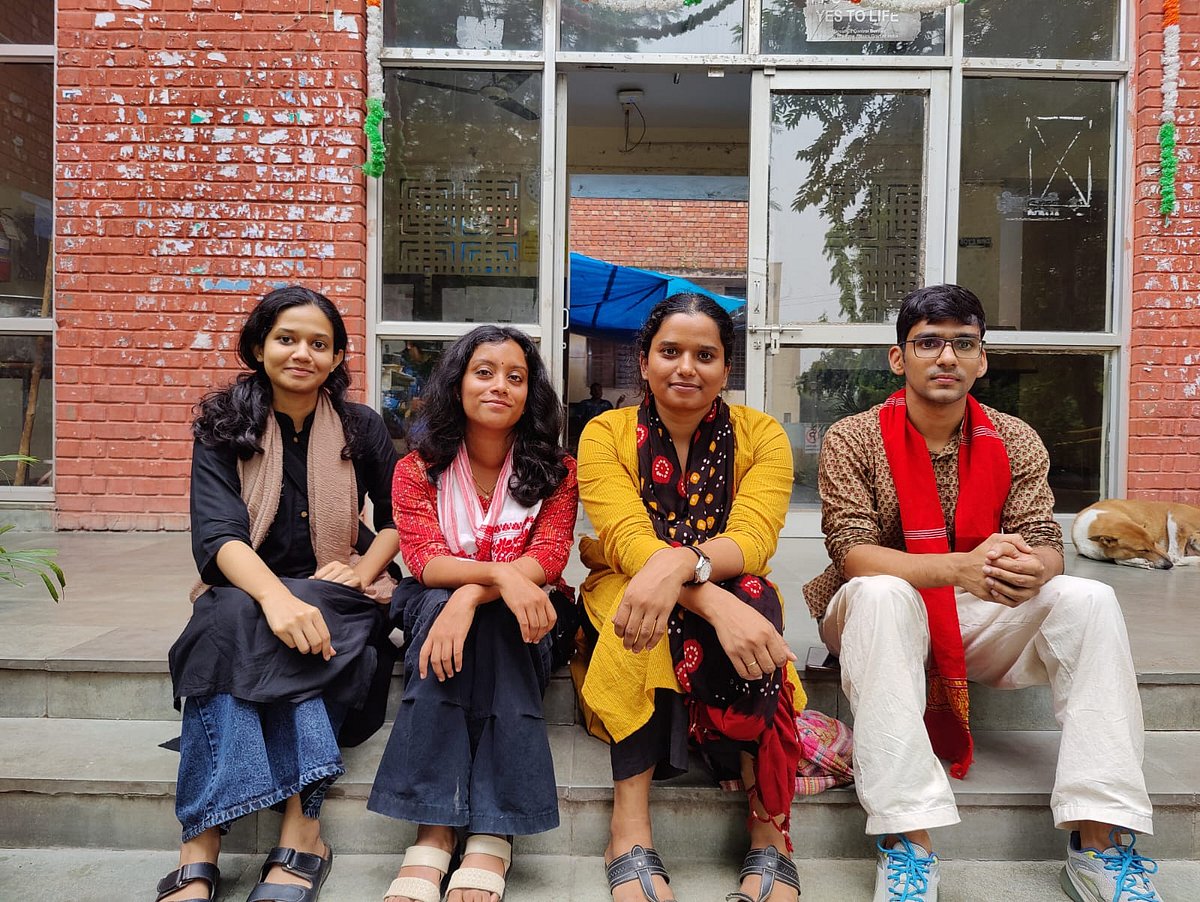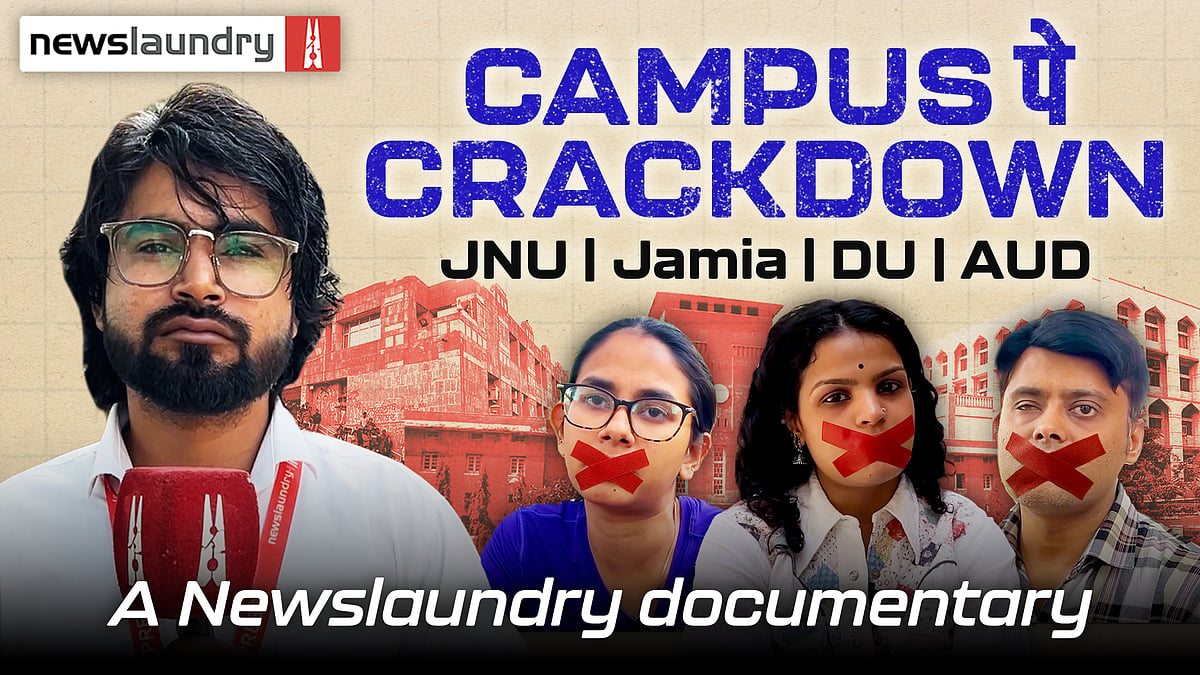Shrinking funds, broken infra, ‘rising fear’: What’s at stake in JNUSU polls this year?
Polling is scheduled for November 4, with results on November 6.
Outside the Jawaharlal Nehru University (JNU) election committee office on Wednesday, a student was seen asking a committee member why his nomination was cancelled. The reason, he was told, was his age and not the wheelchair he used.
Twenty-four-year-old Sandesh, a Bachelor’s student of Spanish, wanted to contest the upcoming JNU Students’ Union elections to represent students with disabilities, whose concerns rarely find space in student politics.
“There are no separate rules for people with disabilities. Who will raise our issues? That is why I wanted to contest but my nomination has been cancelled. If my parents didn’t send me to school on time because of my disability, how is that my fault?” he asked.
This year, 20 candidates are contesting for the four main posts: President, Vice-President, General Secretary, and Joint Secretary. Polling is scheduled for November 4, with results on November 6.
But for many at JNU, there’s been a gradual erosion of democratic space; one that once allowed dissent to thrive but now struggles under the weight of administrative control, fund cuts, and fear.
Newslaundry spoke to several students to understand the issues that will matter this year.
JNUSU polls losing their charm?
A 22-year-old female student, pursuing a Master’s degree in Ancient History from JNU’s Center for Historical Studies, claimed there was a rise in sexual harassment on campus and “both sides” should unite to resolve this. “Gender and caste-based discrimination in the campus should be eliminated, irrespective of being right-wing or left-wing.”
Another MA student said students could now be targeted for what they think and violence had become a “primary response” in many cases. “Checking copies, allotting grades, none of it is anonymous. Teachers know everyone personally and they all have some ideology. So, if for example I pursue a PhD here, it not only depends on my merit but also on my ideology. We can be targeted if we are not aligned with a particular teacher because the government control over the university’s administration and its professors has increased.”
Both the students requested to be anonymous for fear of being targeted. One of them is from Gonda and another from Azamgarh in Uttar Pradesh.
The ancient history student also raised concerns about remarks from BJP leaders targeting JNU, including an old video of Rekha Gupta questioning the need for this university. “Why should it be shut down? Delhi University’s fees have been consistently increasing. People who do not come from financially stable backgrounds, how will they study? Which is why JNU stands out. Our fees, for example, is Rs 250 per semester. Several intellectuals of our times have studied here. So, do they want to promote private institutes instead?”
The other student pointed to attempts to cut funds. “We get Rs 2,000 as Merit-cum-Means (MCM) but earlier this year the administration tried to stop it, claiming a lack of funds. Field trips have reduced, historians who were called from all over the world are no longer invited for seminars, most of the classes do not have working projectors. This is the top university in social science research. Professors across the country dream of teaching here. If such dilapidated conditions exist, what kind of credibility will be left?”
As per a new ‘State of the University’ report by the JNU Teachers’ Association (JNUTA), academic expenditure has decreased by 36 percent, while the share of women students and research scholars has fallen to around 40 percent.
Left organisations losing ground?
Agni, a 24-year-old from West Bengal who is a PhD student at the Centre for Political Studies, said the binary between Left outfits such as SFI and AISA and the RSS-backed Akhil Bharatiya Vidyarthi Parishad was becoming “redundant”.
“Creating an alliance saying that we are against the other, in this case the ABVP, can only work to mobilise people temporarily. While creating an alliance of resisting the right-wing, we also need to place an alternative,” he said. “With the changing times, one needs new means of reaching out to the masses.”
Speaking of ABVP’s focus on student issues, he said it is the “duty of progressive forces to counter this by first, focusing on student issues, and connecting them to the state of the country”.
Meanwhile, Sudhir Kumar, a 24-year-old from Chennai who is pursuing a PhD in law and governance, talked about “increased” fear among the university students. “Students are not mobilising now. And some, despite whatever their ideology may be, go join right-wing parties, because they know they can benefit in getting placements and jobs, or building contacts. That is ruining the culture of political activism here,” he said.
We also met a student from Bihar, who is pursuing a B Tech in Computer Science from the School of Engineering. “Our school is far away from the main campus. The class size is not adequate. Infrastructure has been crumbling. If it rains, the ceiling begins to crack. Our lab, compared to other engineering colleges, is negligible. Hostel washrooms are in a pathetic condition. Rooms don’t have glasses in the windows,” the 18-year-old said.
“But there is no accountability…It is not about being Left or right, parties are not able to bring in the required changes…government is of their (ABVP’s) ideology then, with or without power, why can’t they agitate to ensure our basic needs are met? Ministers do not meet JNUSU leaders but they will meet ABVP activists.”
The presidential debate
In the previous JNUSU polls, Left candidates had bagged three of the four central panel posts to maintain their foothold while the ABVP ended a nine-year phase out of office to win the post of joint secretary.
As the campaign intensifies, the ideological divide finds its most vivid expression in the presidential race – a highlight of the JNUSU elections. Scheduled for Sunday night, the debate will see candidates go toe-to-toe in making their case.
The contrast between the two leading contenders: Aditi Mishra, representing the Left alliance, and Vikas Patel of the ABVP, captures the ideological fault lines.

Aditi accused the ABVP of hypocrisy and of taking credit for development projects while standing with those who have openly targeted the university.
“ABVP is claiming credit for the [construction and opening of] Barak hostel, for e-rickshaws on campus, and for other facilities. These people go shake hands with Chief Minister Rekha Gupta, who has made derogatory statements against JNU and wanted to shut it down. Their presidential candidate leads the violence that has happened on the campus in the past few years. There are videos of him breaking the door of the union office.”
On being asked about having a primarily anti-ABVP agenda instead of focusing on issues, she said, “We never said that student’s issues are not a priority but yes, we are scared of them (ABVP) coming into power, because they make casteist and Islamophobic remarks on camera, without any fear of consequences. So, it is an ideological fight.”
Vikas denied the allegations. “We are not connected with the government though our ideology is aligned. It is good that this government is student friendly and if ABVP wins, we will try to get as much funds for the university.”
Asked about fear among students about the BJP government’s policies impacting the campus, he said, “Whatever is in the nation's interests. If we feel the policies are in the nation's interests, we will welcome it. Otherwise, we will protest against it.”
Support our NL Sena project to bring you ground stories capturing the pulse of Bihar.
 Campus Pe Crackdown: The assault on student activism in India
Campus Pe Crackdown: The assault on student activism in India